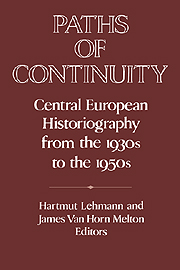Book contents
- Frontmatter
- Introduction: Continuities in German Historical Scholarship, 1933-1960
- 1 German Historiography from the 1930s to the 1950s
- 2 Friedrich Meinecke (1862-1954)
- 3 Change and Continuity in German Historiography from 1933 into the Early 1950s: Gerhard Ritter (1888-1967)
- 4 Hans Rothfels (1891-1976)
- 5 Franz Schnabel (1887-1966)
- 6 Heinrich Ritter von Srbik (1878-1951)
- 7 “Historical Social Science” and Political Myth: Hans Freyer (1887-1969) and the Genealogy of Social History in West Germany
- 8 Some Observations on the Work of Hermann Aubin (1885-1969)
- 9 From Folk History to Structural History: Otto Brunner (1898-1982) and the Radical-Conservative Roots of German Social History
- 10 Werner Conze (1910-1986): The Measure of History and the Historian's Measures
- 11 Continuity, Innovation, and Self-Reflection in Late Historicism: Theodor Schieder (1908-1984)
- Index
1 - German Historiography from the 1930s to the 1950s
Published online by Cambridge University Press: 05 January 2013
- Frontmatter
- Introduction: Continuities in German Historical Scholarship, 1933-1960
- 1 German Historiography from the 1930s to the 1950s
- 2 Friedrich Meinecke (1862-1954)
- 3 Change and Continuity in German Historiography from 1933 into the Early 1950s: Gerhard Ritter (1888-1967)
- 4 Hans Rothfels (1891-1976)
- 5 Franz Schnabel (1887-1966)
- 6 Heinrich Ritter von Srbik (1878-1951)
- 7 “Historical Social Science” and Political Myth: Hans Freyer (1887-1969) and the Genealogy of Social History in West Germany
- 8 Some Observations on the Work of Hermann Aubin (1885-1969)
- 9 From Folk History to Structural History: Otto Brunner (1898-1982) and the Radical-Conservative Roots of German Social History
- 10 Werner Conze (1910-1986): The Measure of History and the Historian's Measures
- 11 Continuity, Innovation, and Self-Reflection in Late Historicism: Theodor Schieder (1908-1984)
- Index
Summary
On 25 April 1957 at about 4 p.m., seven German historians convened at the spa hotel of Bad Ems for a conference entitled “The Social History of the Modern World.” In his keynote address to the conference, which had been financed by the cultural department of the Federal Republic's Home Office, the Heidelberg historian Werner Conze outlined the group's future task. For Conze, the purpose of the group was to subject Hans Freyer's “theory of the present age” to critical and historical scrutiny, either revising it or giving it a solid underpinning. Conze argued that the term “social history” was too narrow to describe this historiographical approach, preferring instead “structural history (Strukturgeschichte) of the modern world.” Since traditional historiography could no longer master the problems of the modern world, asserted Conze, it was necessary “to adapt the historical method to these problems.”
So read the first sentences of the minutes of this inaugural meeting. Now we all know very well that the history of scholarship is the history of processes par excellence. But to the extent that a date can be chosen to mark a significant turning point in the history of a discipline, then 25 April 1957 must be counted as one in the history of German historical scholarship. For the first time a new form of history was openly demanded, and the new concept of structural history was advanced and even institutionalized.
- Type
- Chapter
- Information
- Paths of ContinuityCentral European Historiography from the 1930s to the 1950s, pp. 19 - 48Publisher: Cambridge University PressPrint publication year: 1994
- 2
- Cited by



